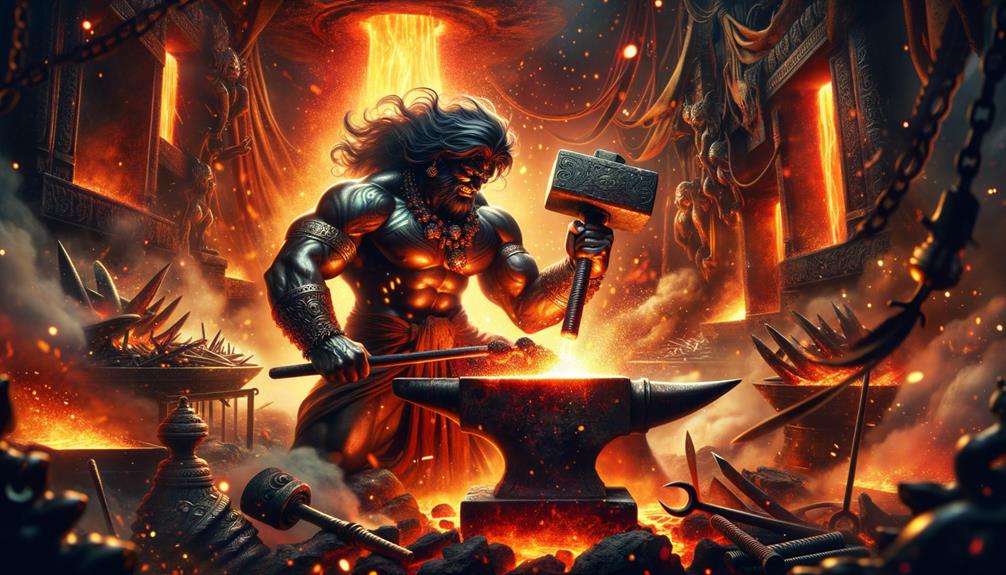When craftsmanship meets mythology, Vulcan's forge often springs to mind – a place where raw materials transform into powerful and awe-inspiring objects. Whether weapons or armor, Vulcan's creations transcend functionality, embodying an ideal of perfection inspiring both artisans and deities. Exploring this legacy grants insight into how ancient cultures revered the convergence of craft and divinity, underscoring Vulcan's enduring mythological significance.
Vulcan's Legendary Forge
Vulcan's mythological forge, hidden beneath Mount Etna, symbolizes divine craftsmanship and fire's transformative power. This scorching workshop serves as the crucible where Vulcan, the god of fire and metalworking, expresses unmatched creativity and skill.
Inside this forge, Vulcan crafts exceptional weapons, armor, and jewelry for deities and heroes. The roaring flames and molten metals signify fire's raw, altering force – an element that births and razes. Under Mount Etna's watchful gaze, Vulcan's mastery as a blacksmith shines.
Vulcan's creations showcase his metalworking prowess. His forge transcends labor, becoming a hallowed space of innovation. Each hammer strike infuses metal with divine energy, forging items of immense power and beauty. Whether Jupiter's thunderbolts or intricate jewelry, Vulcan's mythological forge remains an enduring symbol of fire, creativity, and skilled craftsmanship's profound harmony.
Masterpieces of War
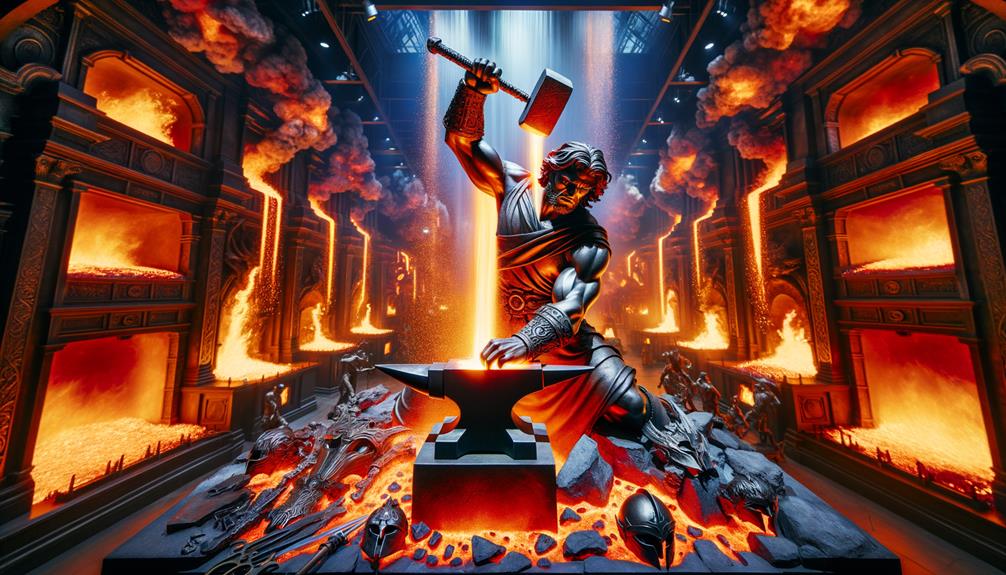
In the grand tales of myth, weapons forged by Vulcan stood as undeniable proof that gods intervened in mortal conflicts. The Roman deity Vulcan, lord of fire and the forge, crafted armor and weapons of unmatched strength and protection. His creations—Jupiter's lightning bolts, Mars' armor—weren't mere tools of war but embodiments of divine might and precision.
Vulcan's masterpieces played pivotal roles, aiding gods and heroes. His skills highlighted his crucial importance in Roman mythology. These weren't instruments of destruction but representations of divine craftsmanship and power.
| Item | Divine Owner |
|---|---|
| Jupiter's Lightning Bolts | Jupiter |
| Mars' Armor | Mars |
| Aeneas' Shield | Aeneas |
Myths reveal how Vulcan's creations bridged mortal and divine realms, granting gods and heroes unmatched protection and power. Their precision made them invaluable in ancient war narratives. Understanding Vulcan's role showed that crafting weapons wasn't just physical labor but a sacred act, imbued with fire and intent.
Artistry in Armor
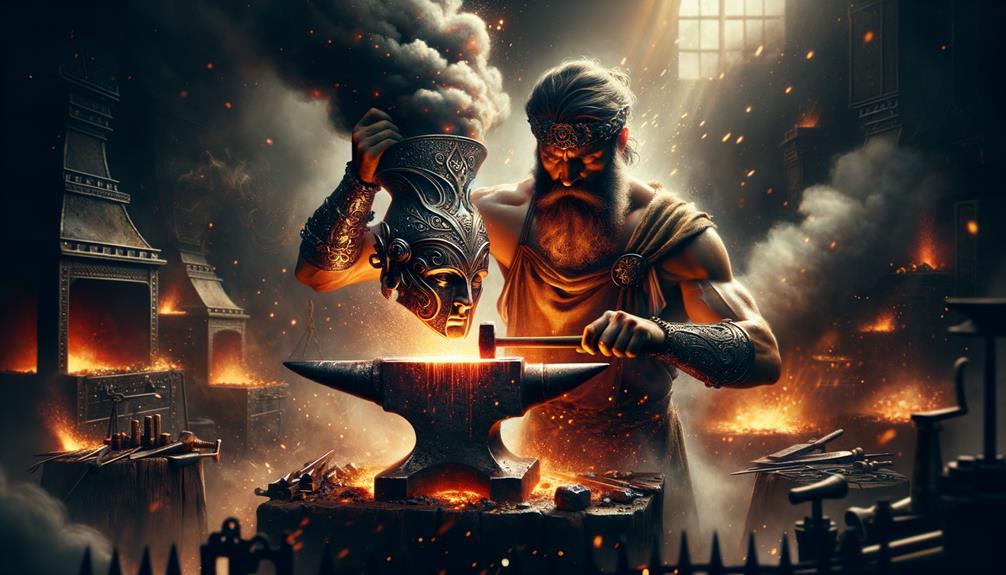
Vulcan's forge embodied metalworking's finest artistry, crafting armor pieces that guarded warriors while showcasing breathtaking aesthetics. As the skilled Roman blacksmith deity, Vulcan tailored helmets, shields, breastplates, greaves, and gauntlets to each wearer's needs, be they a mighty god or mortal hero.
His armor didn't merely deflect blows; it augmented the bearer's power and resilience through mystical qualities only Vulcan's smithing skills could bestow. This supernatural edge set his creations apart, making them prized possessions across the realms of gods and mortals.
While comparable mythological figures like the Greek Hephaestus shared metalworking prowess, Vulcan's distinct Roman flair shone through. His armor encapsulated more than martial utility; it became a canvas for divine artistry, reflecting the profound symbiosis between craftsmanship and the celestial.
Influence on Craftsmanship
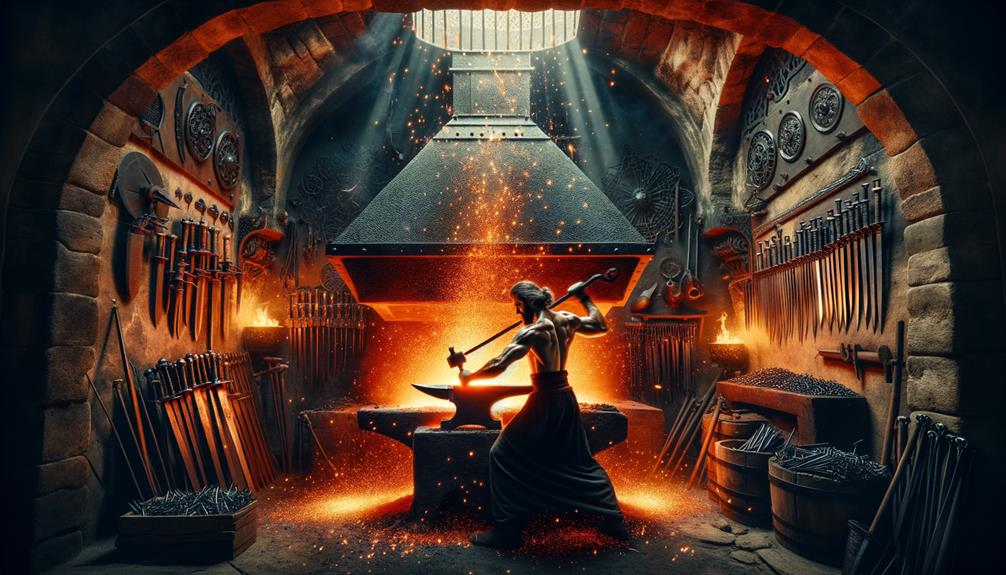
From his scorching forge beneath Mount Etna, Vulcan, the metallurgy deity, exerted a profound influence on metalworking's essence. In ancient times, his mastery transformed raw materials into intricate weapons, armor, and jewelry pieces. Vulcan's forge symbolized fire's transformative power, breathing life into lifeless metal.
Vulcan's impact on craftsmanship raised the bar for quality and precision. Each item bearing his guidance exhibited divine perfection. Inspired by Vulcan, ancient blacksmiths dedicated themselves to meticulous metallurgy, aiming to emulate his legendary skills.
Vulcan's association with skilled craftsmanship highlighted dedication and creativity's importance. His creations blended utility with beauty, turning ordinary metal into extraordinary art. Through his legacy, the ancient world understood the forge as a crucible for innovation and excellence, not just labor.
Cultural Significance
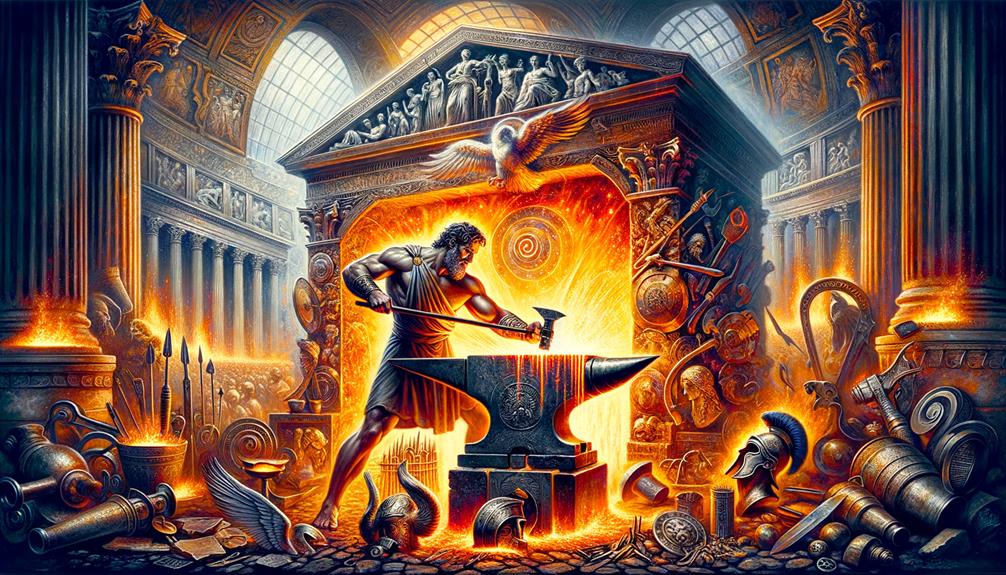
Vulcan's role in Roman mythology represents the pinnacle of craftsmanship and skill. His mastery of fire and metalwork symbolizes human creativity and industriousness. Vulcan's metalwork isn't just about forging weapons and armor; it showcases the transformative power of fire, turning raw materials into objects of artistry and utility.
In examining Vulcan's cultural significance, one sees how his association with fire and volcanoes highlights the essential nature of industrial arts. Fire, as a creative and destructive force, mirrors the dual aspects of human ingenuity—capable of both construction and devastation. Vulcan's mastery over this element underscores the importance of skilled labor and the artistry involved in metal crafting, elevating these practices to a divine level.
Similar deities like Hephaestus in Greek lore also emphasize the value of craftsmanship and creativity. These blacksmith gods collectively illustrate an archetypal theme: the reverence for those who possess the skill and mastery to manipulate fire and metal. Their stories remind us that creativity and industriousness are central to human progress and cultural development.
Frequently Asked Questions
What Did Vulcan Make?
As a mythological blacksmith, Vulcan crafted mighty weapons, intricate jewelry, and tough armor. He also forged legendary items like Achilles' shield and Pandora's box. His work represents human creativity, divine artistry, and the duality of creation and destruction.
Who Is the God of Craftsmen and Blacksmiths?
In Roman mythology, Vulcan stood as the revered deity of craftspeople and blacksmiths. This skilled god expertly commanded the forge, shaping metal with divine mastery and molding Roman artistry through his fiery craft. His legacy burns bright within the realm of metalworking, ingrained in ancient beliefs.
What Weapons Did Vulcan Make?
Vulcan, the ancient Roman blacksmith deity, crafted legendary weapons steeped in mythology. His creations, like Jupiter's thunderbolts and Mars' armor, symbolized divine power. Vulcan also forged Achilles' impenetrable shield and Athena's formidable Aegis, archetypes embodying protection and conflict in comparative mythologies.
Who Is the Greek God of Fire Crafts and Blacksmiths?
Hephaestus, the Greek deity mirroring Roman Vulcan, personified craftsmanship's transformative power – creation and destruction intertwined. As a skilled blacksmith, his mythical presence resonates with contemporary artisans, reminding us of the artistry within forging tools and objects. Like a seasoned metalworker, Hephaestus shaped raw materials into functional yet beautiful pieces, a metaphor for the human capacity to mold our realities through persistence and ingenuity.

